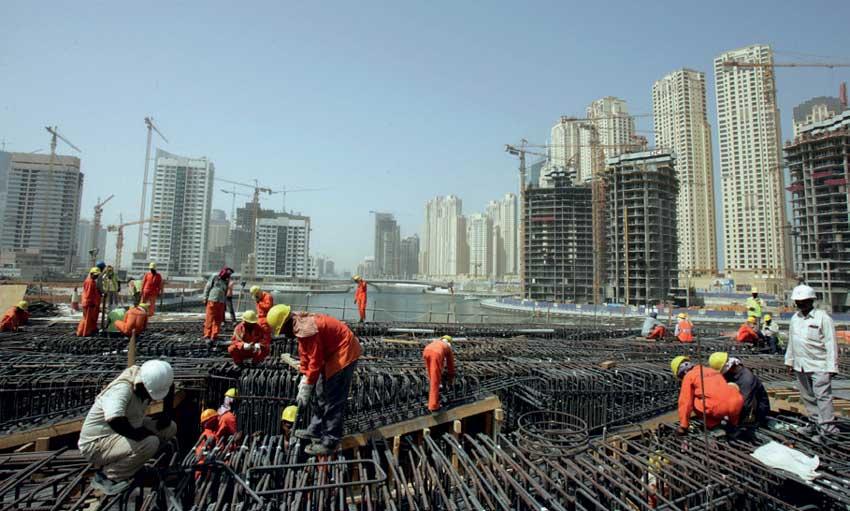21 Apr 2020 - {{hitsCtrl.values.hits}}

By Nishel Fernando
Over 50,000 Sri Lankan migrant workers stranded mainly in the Gulf countries are anxiously awaiting to return to the country amid health risks, job losses and pay cuts caused by the coronavirus (COVID-19) pandemic, according to the latest reports.
In particular, swaths of migrant workers, who were employed in the construction and hospitality sectors in the Gulf countries, have either lost their employments or faced with steep pay cuts.
Consequently, these migrant workers, who had been surviving from pay cheque to pay cheque, are now struggling to find food supplies and basic necessities with some being forced to live in
dire conditions.
Many of these migrant workers have flocked to Sri Lankan Missions in respective countries seeking dry food rations and other necessities.
Sri Lankan Missions based in these respective countries along with the funds from donors and governments of respective countries are struggling to cope with the rising demand for these supplies.
A spokesperson of Sri Lanka’s Association of Licensed Foreign Employment Agencies (ALFEA) told Mirror Business yesterday that the number of Sri Lankan migrant workers who seek relief and want to return to the country is increasing every day.
“Some employers told them to work for six months without salaries. Some employers are cutting the salaries of their employees by as much as 50 percent,” he noted.
According to a recent report published by the Business and Human Rights Resource Centre, many low-skilled migrant workers, particular in the construction sector, live in tightly-packed, often unsanitary, labour camps – conditions perfect for the spread of COVID-19.
Recently, the Labour Ministry of Qatar fined three construction firms for flouting the health and safety measures to prevent COVID-19 spread.
Meanwhile, the ALFEA spokesperson highlighted that remittance flows to Sri Lanka have come into a virtual halt, which he cited as the main reason for the recent steep depreciation of the rupee against the US dollar.
The worker remittances remain Sri Lanka’s main source of foreign exchange earnings, usually hovering around US $ 7 billion per annum for the past few years.
“For the last one and half months, there were almost no remittance inflows coming from migrant workers. This is a key reason for the recent depreciation of the rupee against the US dollar,” he said.
Although the employments of Sri Lanka’s migrant workers as domestic help remain largely unaffected despite the pandemic, the ALFEA spokesperson noted that these migrant workers are unable to remit their incomes to their families in Sri Lanka due to the travel restrictions in the host countries.
Further, the foreign employment agents are also facing issues as the employers of Sri Lankan migrant workers have halted paying service charges to the agents.
The ALFEA in a press release noted that these service charges amount to around US $ 3 billion per annum, excluding the direct remittances from migrant workers.
There are around 1.7 million overseas employees and five million beneficiaries from them. About 90 percent of these migrant workers have been employed through the 900-member agencies of the ALFEA.
The Association of Licensed Foreign Employment Agencies (ALFEA) seeks direct intervention of the president and prime minister to revive Sri Lanka’s foreign employment trade, which is badly hit by the coronavirus (COVID-19) pandemic.
The ALFEA recently submitted its proposals via a letter to the Sri Lanka Bureau of Foreign Employment (SLBFE), which was also copied to President Gotabaya Rajapaksa and Prime Minister Mahinda Rajapaksa.
“Our business has been completely stalled due to the COVID-19 pandemic. We recognise our sector is the only sector that can recover foreign exchange without any investment in the immediate aftermath of this pandemic,” the ALFEA stated in a media release.
The 900-member agencies of the ALFEA currently provide direct and indirect employment opportunities for almost 100,000 people within the country to facilitate foreign employment for Sri Lankan migrant workers.
As an urgent measure, the ALFEA is seeking a working capital loan sufficient for six months, which is payable in five years with no requirement of collateral and a six-month grace period.
The association stressed that the working capital is urgently needed to stay afloat, promote and bring in
new businesses.
“The businesses of majority of agencies are in the verge of collapse due to the lack of working capital caused by the extended closure of their offices,” the letter read.
For the revival of the sector, the ALFEA is mainly seeking the government to cut the bureaucratic red tape triggered by certain regulations and laws.
It urged the government to revoke the controversial family background report (FBR) system and grant the approval based on the guardian consent.
It also requested the government to revoke the FBR requirement entirely for non-domestic female migrant workers, with immediate effect.
The association expects that this move alone could potentially generate 100,000 employment opportunities per annum, bringing the much-needed inflows of foreign exchange to the country.
It also proposed cutting the age limit for female workers, fixing the matched salary scheme for male workers, exemption of recruitment documents being attested based on foreign firms’ reputation, pre-departure financial assistance to male workers through state banks, reduction of passport fees, grant up to US $ 5000 duty free allowances for migrant workers, reduction of training period and removal of taxes on foreign remittances entirely.
The ALFEA emphasised that the president, prime minister and Cabinet need to step up to revive the industry, implementing the said proposals, as the SLBFE doesn’t have the powers to implement these proposals by itself.
“If the government intervenes in this matter, we would like to state that we will be committed to obtain a large amount of foreign exchange during the year by recreating the foreign employment sector and providing a secure migration service,” the ALFEA said.
17 Nov 2024 2 hours ago
17 Nov 2024 2 hours ago
17 Nov 2024 2 hours ago
17 Nov 2024 2 hours ago
17 Nov 2024 5 hours ago